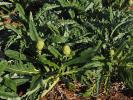Erasmus+ Project: Training and improving agroforestry skills in Europe
- Type Project
- Status Filled
- Execution 2018 -2021
- Assigned Budget 21.112,00 €
- Scope Europeo
- Autonomous community Andalucía
- Main source of financing Erasmus +
This project was implemented by the Agricultural Department of the Aljanadic Secondary School, within the framework of the Erasmus+ program, under the KA102 program, for the intermediate level of Technician in the Use and Conservation of the Natural Environment and Basic Vocational Training in Agro-gardening. The school is located in a small municipality in the fertile Vega del Guadalquivir, on the edge of the Sierra Morena, in the province of Córdoba.
The forestry and environmental sectors are of great importance in the area, where some of the main economic activities come from hunting, cork extraction, and livestock farming. Conservation activities for its many endangered species, as well as those related to nature tourism, also contribute to the improvement of the local economy.
The students come from neighboring areas and the main city, with a marked rural vocation and, sometimes, from unfavorable socioeconomic situations, which affects their training and future prospects. We had never participated in a KA102 before, so it was the first time for Basic Vocational Training students and the first time we participated in our own project for these levels (previous mobility projects came from a consortium of the Regional Government of Andalusia). The profile of the participating students was, on average, 17 to 19 years old, in Basic or Intermediate Vocational Training, and from a disadvantaged sociocultural background. They had low language skills and had never traveled abroad or used public transportation such as trains or planes.
- Four short stays (2 weeks) for Basic Vocational Training students at the public company that manages the Nadour Natural Park in Portugal.
- They completed practical work related to public infrastructure maintenance and environmental education. In their free time, they explored neighboring towns.
- The group of students had an accompanying teacher (5th mobility).
- Two long, three-month stays at an agritourism company in Poland. These were for students in the Intermediate Forestry Engineering program. During their stay, they participated in activities for children as supervisors at the farm school.
- Expand job opportunities for students.
- Reduce school dropout rates.
- Improve linguistic, communicative and social skills.
- Enrich their culture with that of other European countries and European values.
- Learn new working methods in the agroforestry sector.
- Attracting new partners.
- Improve knowledge of the center's strengths and weaknesses. Improve its management by learning how to use platforms and applications.
These companies have established themselves as preferred partners, and students from other projects have undertaken internships with these companies: Noudar in Portugal and Agroturismo Brzoza in Poland. The internships have improved language learning, especially among students in Basic Vocational Training. The improvement in students' professional skills and competencies has been significant. Participation in this project, as well as the empowerment of students through experiencing a context completely different from their own, has led them to continue their studies in higher education (intermediate and advanced vocational training, in each case). We have observed that this program contributes to reducing dropout rates, especially among students in Basic Vocational Training, and increases enrollment in the Intermediate Cycle of Forestry Engineering.
The project results were disseminated through social media, as well as internally in department meetings and meetings, such as those of the teaching staff and the Pedagogical Coordination Technical Team. The mobility projects took place during the 2018/19 academic year and others during the 2019/20 academic year, and were disseminated at the end of these and at the beginning of each academic year to present the Erasmus project to incoming students. These students were tutored by the host school and in continuous coordination with our school. The long-term benefits are very difficult to assess, but if one thing is clear beyond doubt, it is that participation in the Erasmus+ Program brings benefits to all its participants, benefits of all kinds: It improves the school's image, making us stronger, growing, and opening up multiple possibilities in every sense—technical, personal, financial, etc.—for all stakeholders within the school and in the local and regional context.
- Coordinator/entity name: IES ALJANADIC
- Postal address: Calle Almodóvar del Río S/N, 14730 Posadas
- Telephone: 957719541
- Ies Aljanadic
- Agroturismo BIRCH
- EDIA-ALQUEVA SA EMPRESA DE DESARROLLO E INTERESTRUCTURAS
- FUNDACIÓN EDMUND MACH
- Kainuu Vocational College
- Gimnasio Profesional de Viticultura y Enología "Alexandar Stamboliiski" - Pleven







